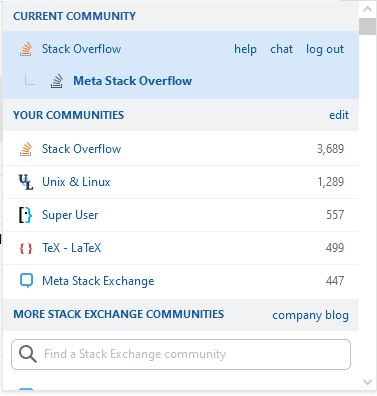The top-level domain (TLD) matters.
You'll have to authenticate in each top-level domain, aka stackoverflow.com, severfault.com, superuser.com, mathoverflow.com, askubuntu.com, stackapps.com and stackexchange.com once and from there Universal Login will log you in on any other site under that same TLD.
This used to work across all domains owned by SE, but security and privacy concerns made that stricter handling of cookies by the major browsers broke that functionality. I explain that in my answer on Did something change with Stack Exchange's cross-domain login process? (no longer working) and I'll quote Yaakov from their answer for any chance on fixing the behavior:
We can't think of things we can do to alleviate this short of completely changing the way that we handle cross-domain auth (and only if we can find a way to do so that will not run into the same browser issues that we are running into now).
So based on your screenshot I crafted this table:
| Community |
TLD |
Universal login for domains |
| Stack Overflow |
stackoverflow.com |
meta and main of Stack Overflow |
| Unix & Linux |
unix.stackexchange.com |
all sites under *.stackexchange.com |
| Super User |
superuser.com |
meta and main of Super User |
| Tex & Latex |
tex.stackexchange.com |
all sites under *.stackexchange.com |
| Meta Stack Exchange |
meta.stackexchange.com |
all sites under *.stackexchange.com |
If you're logged out everywhere and then login in again I expect you to have at least authenticate 3 times for your communities. Note that there are other factors that might require re-authenticating, like expiring of cookies or server side reset of your session. There are several reports from users that have their sessions invalidated rather often, but so far I haven't seen a common reason / reliable reproduction or confirmation from SE staff what causes these invalidations.
In the comments you asked:
Can't there be a single "auth-provider" that other sites trust and use?
Well, Stack Exchange did have that. It was an OpenID server, but somehow that service wasn't used to replace Global Auth, instead the whole OpenID server got sunsetted in 2018: Support for OpenID ended on July 25, 2018
